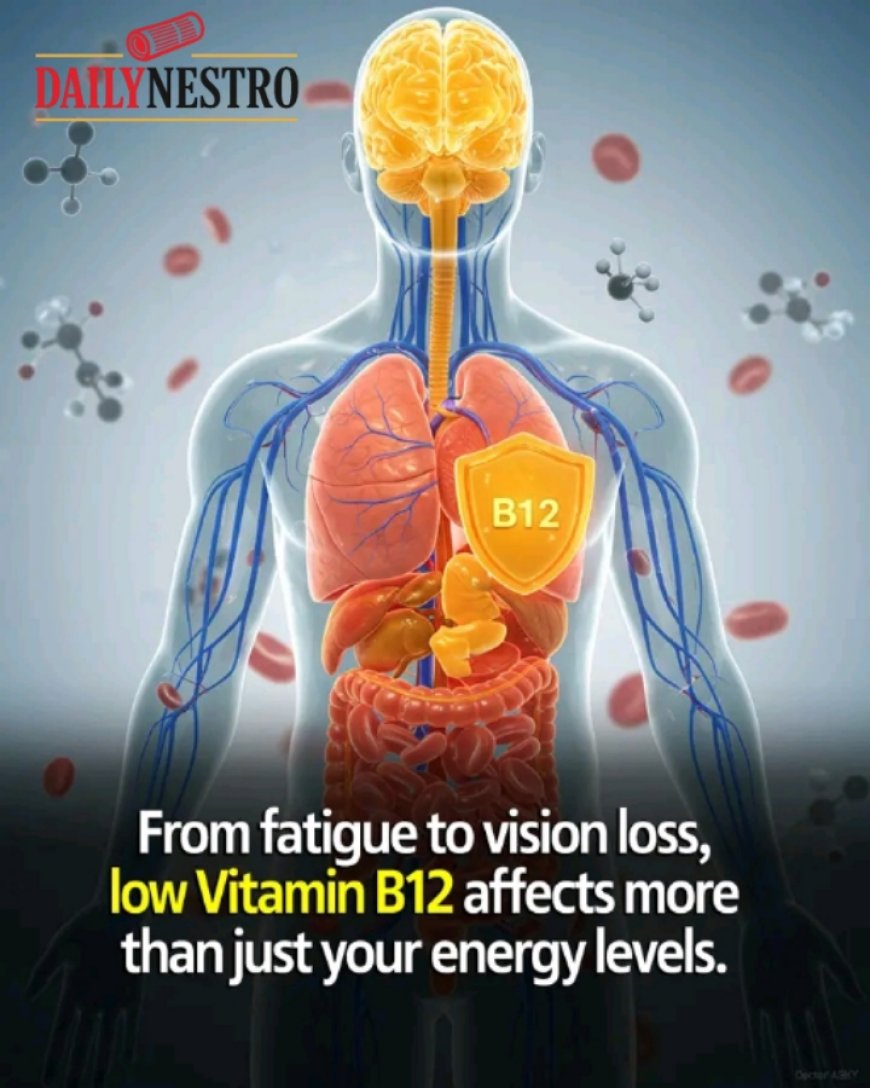Vitamin B12 plays a huge role in keeping your brain sharp, immune system strong, and energy levels stable.
Vitamin B12 plays a huge role in keeping your brain sharp, immune system strong, and energy levels stable.

The Power of Vitamin B12: Why You Need It and How to Spot a Deficiency Early
In today’s fast-paced world, feeling tired or foggy might seem normal—but what if there’s a deeper reason behind it? One often overlooked cause of fatigue, brain fog, and even mood swings is vitamin B12 deficiency. This essential nutrient plays a critical role in keeping your body and mind functioning at their best, yet millions of people worldwide are unknowingly running low on it.
Whether you're following a plant-based diet, getting older, or managing chronic health conditions, understanding the importance of vitamin B12 could be the key to regaining your energy, focus, and overall wellness.

What Is Vitamin B12 and Why Is It So Important?
Vitamin B12 also known as cobalamin, is a water-soluble vitamin that your body needs to carry out several vital functions:
▫️Helps form red blood cells
▫️Supports healthy nerve cells and brain function
▫️Plays a role in DNA synthesis
▫️Assists in energy metabolism
▫️Contributes to mood and mental clarity
Since your body doesn't produce B12 on its own, you must get it through food or supplements. B12 is naturally found in animal-based foods, such as meat, fish, eggs, and dairy—making it more difficult for vegans and vegetarians to meet their daily needs without supplementation.
Why B12 Deficiency Is More Common Than You Think
Despite its importance, vitamin B12 deficiency is surprisingly widespread. Some groups are more at risk than others, including:
▫️Adults over age 50(reduced stomach acid makes it harder to absorb B12)
▫️Vegans and vegetarians(plant-based diets often lack natural B12 sources)
▫️People with digestive disorders, such as Crohn’s disease, celiac disease, or pernicious anemia
▫️Those taking certain medications, like metformin (for diabetes) or proton pump inhibitors (for acid reflux), which can interfere with B12 absorption
▫️Individuals who’ve had gastrointestinal surgery (such as weight loss surgery)
Many people with low B12 don’t realize it until symptoms start to interfere with their daily lives.
Early Warning Signs: How to Recognize a Vitamin B12 Deficiency
B12 deficiency can show up in different ways, and some symptoms may be mistakenly attributed to stress, aging, or other conditions. Paying attention to the following signs can help you catch a deficiency early:
1. Constant Fatigue or Weakness
If you feel drained all the time—even after a full night’s sleep—this could be one of the first red flags. Low B12 means your body can’t produce enough red blood cells, leading to reduced oxygen flow and energy.
2. Brain Fog and Memory Issues
Forgetfulness, difficulty concentrating, and a general sense of mental cloudiness are common symptoms. Many people describe it as feeling “off” or not mentally sharp
3. Numbness and Tingling
A lack of B12 can lead to nerve damage, which may cause a pins-and-needles sensation in your hands, feet, arms, or legs.
4. Dizziness or Balance Problems
Feeling unsteady or dizzy when standing up or walking could indicate that your nervous system isn’t functioning properly.
5. Mood Changes
Vitamin B12 helps produce neurotransmitters like serotonin and dopamine. Low levels have been linked to depression, anxiety, and mood swings.
6. Pale or Yellowish Skin
When your body lacks B12, red blood cell production drops, leading to a pale appearance. A yellowish tinge may also appear due to the breakdown of red blood cells.
7. Smooth or Sore Tongue
Glossitis—a swollen, smooth, or sore tongue—can be an unusual but telling sign of deficien
8. Blurred Vision
In more severe cases, damage to the optic nerve can result in visual disturbances or even vision loss.
How to Get Tested for Vitamin B12 Deficiency
If you're experiencing any of these symptoms, don't ignore them. A simple blood test can measure your B12 levels and help identify a deficiency early. Some healthcare providers may also check your homocysteine and methylmalonic acid levels, which are more sensitive markers for detecting B12-related issues.
How to Improve Your Vitamin B12 Levels
If you are diagnosed with a B12 deficiency, don’t worry—treatment is typically straightforward and effective. Depending on the severity, your healthcare provider may recommend:
1. Dietary Changes
Include more B12-rich foods in your meals, such as:
▫️ Beef liver and organ meats
▫️Salmon, tuna, and sardines
▫️Eggs and dairy products
▫️Fortified cereals, plant-based milk, and nutritional yeast (especially important for vegans)
2. Vitamin B12 Supplements
Oral B12 supplements are widely available and effective for many people. For those with absorption issues, high-dose sublingual (under-the-tongue) tablets or sprays may be recommended.
3. B12 Injections
In more serious cases, especially if your body has trouble absorbing B12 from food or pills, regular injections may be prescribed to quickly restore healthy levels.
How Long Does It Take to Feel Better?
Many people begin to notice improvements within a few days or weeks of starting treatment. Energy levels often rise first, followed by improved focus, mood, and reduction in physical symptoms like numbness or weakness. However, nerve-related symptoms may take longer to resolve, depending on how advanced the deficiency was.
Don’t Overlook This Vital Nutrient
Vitamin B12 may not get as much attention as other vitamins, but its impact on your health is profound. From brain function to mood, energy, and immunity, B12 helps your body thrive. Unfortunately, deficiencies are common—and often go unnoticed until symptoms start interfering with daily life.
If you're feeling unusually tired, forgetful, moody, or experiencing any of the symptoms mentioned above, talk to your healthcare provider. A quick test could be the first step toward feeling like yourself again.
The sources: healthline , WebMD







